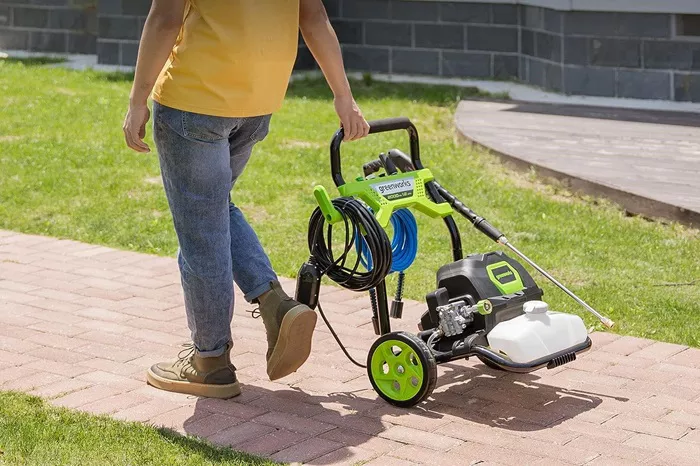What Is A Greenworks 2000 PSI Electric Pressure Washer?
The Greenworks 2000 PSI Electric Pressure Washer is an efficient, user-friendly tool designed to handle a wide variety of outdoor cleaning tasks. Its powerful motor delivers high-pressure water flow, perfect for tackling everything from dirt on driveways to grime on vehicles. One of its standout features is the built-in soap dispenser, allowing users to apply detergent easily during washing for a deeper clean. In this guide, we will walk you through the process of using soap with your Greenworks pressure washer, ensuring you achieve professional results every time.
Safety Precautions
Before starting any cleaning task, safety is paramount. Here are a few precautions to follow when using the Greenworks 2000 PSI Electric Pressure Washer:
Wear Protective Gear
Always wear safety goggles and gloves to protect yourself from debris and chemicals. The high-pressure water can also cause injury if misused.
Clear the Work Area
Ensure the area you are cleaning is free of obstacles, tools, or loose debris that might be moved by the high-pressure water stream.
Ventilation
If you are using chemical detergents, work in a well-ventilated area to avoid inhaling fumes. Some cleaning solutions can emit harmful vapors when sprayed.
Preparing the Pressure Washer
Before you begin, ensure your Greenworks pressure washer is ready for use:
Check the Soap Tank
Open the soap dispenser and ensure it is filled with the appropriate cleaning detergent. You can use a variety of pressure washer soaps, such as all-purpose cleaners, car wash soaps, or specialized products for specific surfaces. Be sure to use only the recommended soap for electric pressure washers.
Attach the Soap Nozzle
The Greenworks pressure washer typically comes with different nozzles for different purposes. To use soap, attach the soap nozzle, which is usually a low-pressure nozzle. This nozzle allows the detergent to mix with the water and be applied gently to the surface.
Using the Soap Dispenser
Now that your pressure washer is set up, follow these steps to activate the soap dispenser:
Activate the Soap Dispenser
With the soap nozzle attached, turn on the pressure washer and squeeze the trigger to start spraying water. The soap dispenser will automatically start drawing soap from the tank and mixing it with the water stream.
Adjust Pressure
For soap application, you need to adjust the pressure to the low setting. This helps to apply the detergent more evenly and gently, allowing it to adhere to the surface without causing damage.
Spray the Soapy Water
Begin spraying the soapy water on the surface you intend to clean. Apply the soap in a sweeping motion, ensuring you cover the entire area. Allow the soap to sit for a few minutes to break down dirt, grime, or grease.
Rinsing
After allowing the soap to sit, it’s time to rinse away the detergent and dirt:
Switch Nozzles
After the soap has had time to work, switch to the high-pressure nozzle to rinse off the detergent and debris. The higher pressure will ensure that the surface is thoroughly cleaned and the soap is completely washed away.
Rinse Thoroughly
Make sure to rinse the area completely to avoid any soap residue. Leftover soap can create streaks or attract dirt, reducing the effectiveness of your cleaning.
Maintenance
Proper maintenance of your pressure washer and soap dispenser ensures a long lifespan and optimal performance:
Clean the Soap Dispenser and Nozzle
After each use, rinse the soap dispenser and nozzle thoroughly with clean water to prevent clogs. Soap residue can build up over time and cause the dispenser to malfunction.
Store Properly
When not in use, store the pressure washer in a dry, safe place. Make sure the hose is properly coiled to avoid kinks, and check for any loose or worn parts that may need attention.
Troubleshooting
Here are some common issues you might face with the soap dispenser and how to fix them:
Soap Not Dispensing Properly
If the soap isn’t dispensing correctly, check the soap tank to ensure it has enough detergent. Also, ensure that the soap nozzle is attached securely and not clogged.
Clogged Nozzle
If the nozzle is clogged, detach it and clean it thoroughly with warm water. A small brush can help remove any soap buildup or debris.
Low Pressure
If you’re experiencing low pressure, it might be due to a clogged nozzle or hose. Clean the components thoroughly, and ensure there are no blockages.
Additional Tips
To maximize your pressure washing results, consider the following additional tips:
Best Types of Soap
Use detergents that are designed specifically for pressure washers, as they are formulated to work with the high-pressure water stream. For general cleaning, all-purpose cleaners are a good choice. For vehicle cleaning, look for car wash soaps that are gentle on paint.
Experiment with Soap Concentrations
For different cleaning tasks, experiment with the concentration of soap in the tank. For lighter cleaning jobs, you may want to dilute the detergent more, while for heavily soiled areas, a more concentrated solution may be necessary.
Use Different Nozzles for Different Tasks
In addition to the soap nozzle, your Greenworks pressure washer likely comes with a range of other nozzles. Use a fan-shaped nozzle for broad coverage and a pinpoint nozzle for tough stains.
Conclusion
The Greenworks 2000 PSI Electric Pressure Washer is a powerful tool for a variety of cleaning tasks, and the soap dispenser feature enhances its cleaning capabilities. By following these simple steps, you can use soap effectively to remove stubborn dirt and grime, leaving your surfaces spotless. Remember to take the proper safety precautions, perform regular maintenance, and troubleshoot common issues to ensure the longevity and efficiency of your pressure washer.
Related topics:
- How Much Is It to Service a Lawn Mower?
- How to Work a John Deere Riding Lawn Mower: A Complete Guide
- How to Start a Craftsman Power Washer: A Step-by-Step Guide

